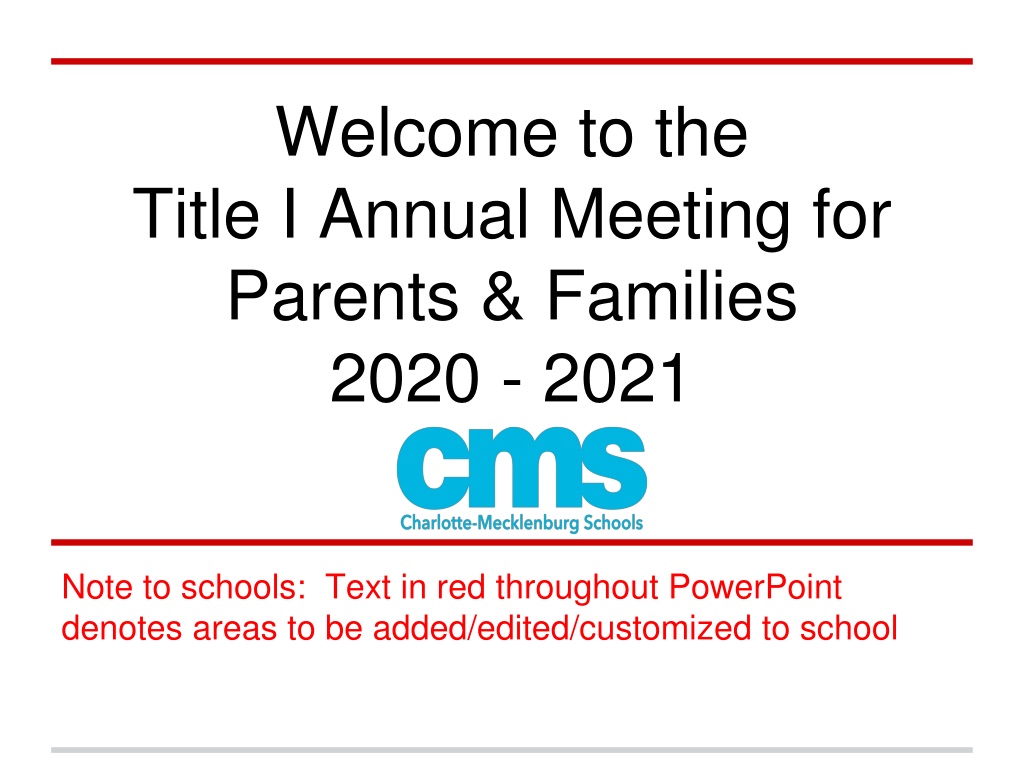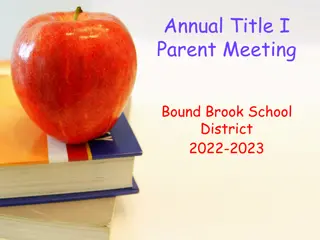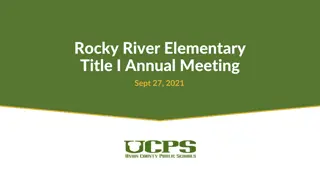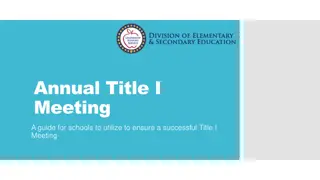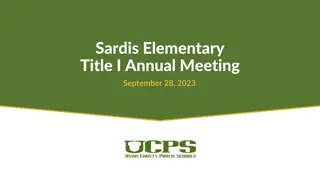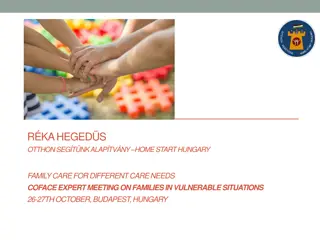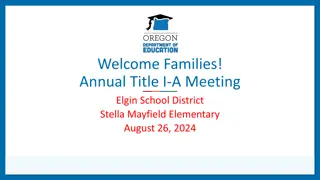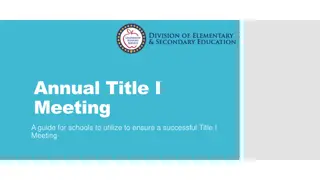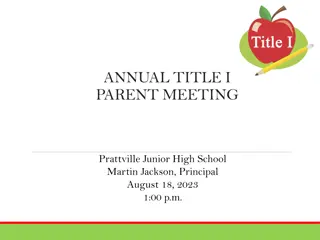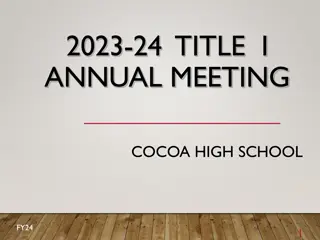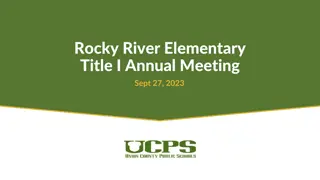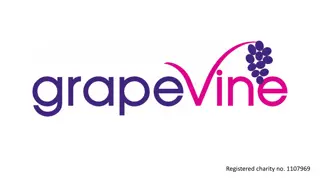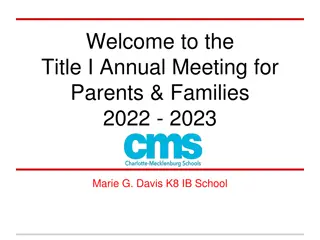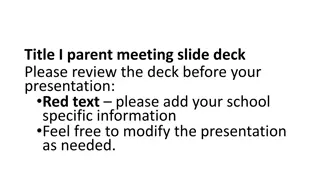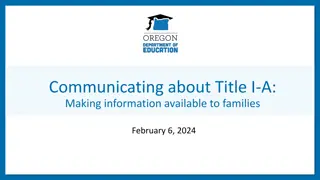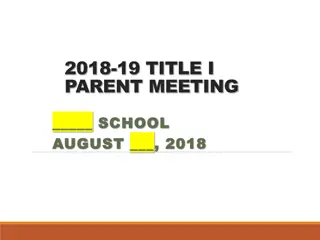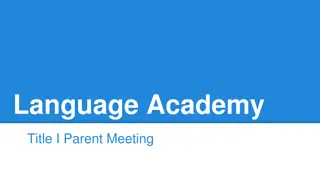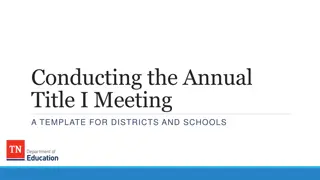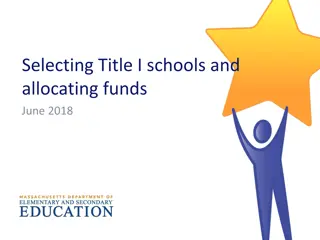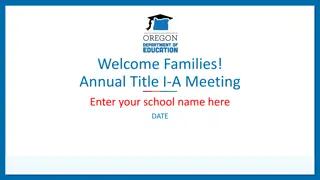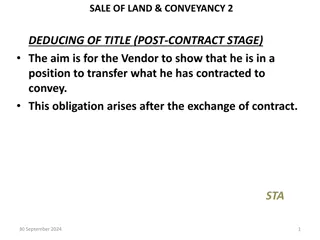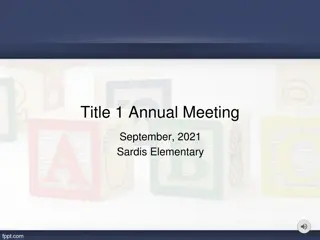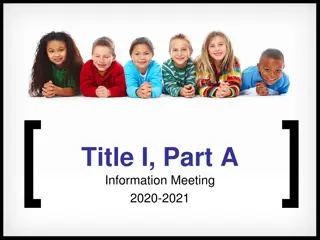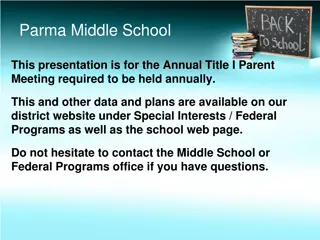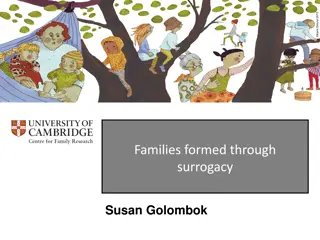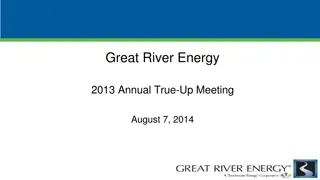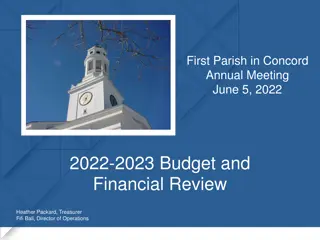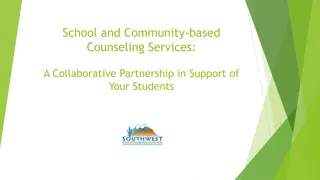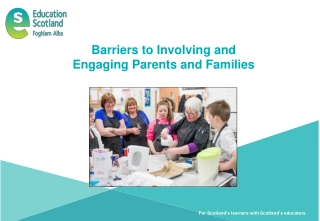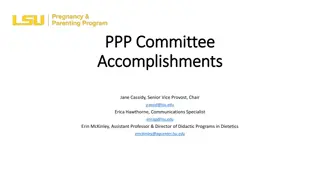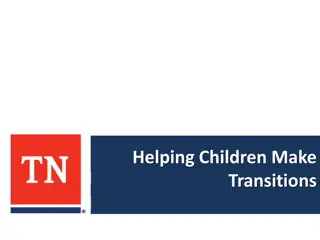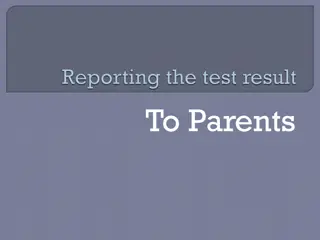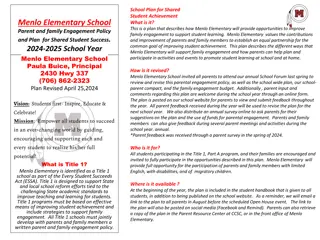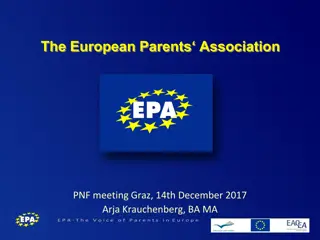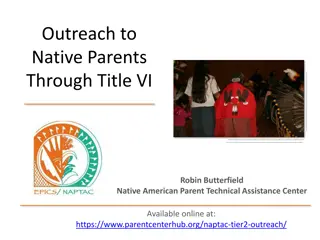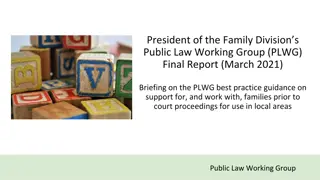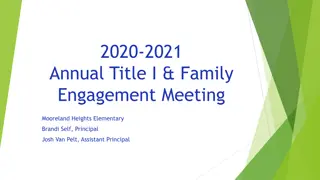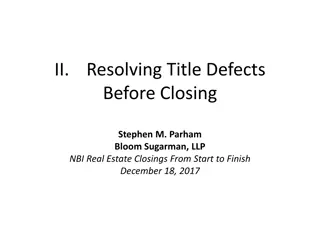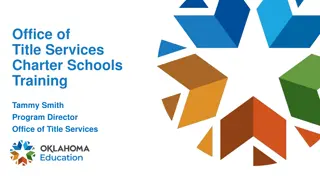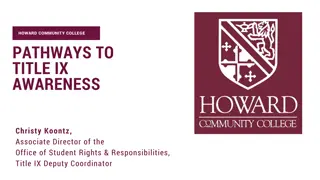Title I Annual Meeting for Parents & Families 2020-2021
Annual Meeting for Parents & Families regarding Title I program requirements, school participation, rights, and engagement. Learn about Title I schools, funding, family engagement policies, teacher qualifications, and more.
Download Presentation

Please find below an Image/Link to download the presentation.
The content on the website is provided AS IS for your information and personal use only. It may not be sold, licensed, or shared on other websites without obtaining consent from the author. Download presentation by click this link. If you encounter any issues during the download, it is possible that the publisher has removed the file from their server.
E N D
Presentation Transcript
Welcome to the Title I Annual Meeting for Parents & Families 2020 - 2021 Note to schools: Text in red throughout PowerPoint denotes areas to be added/edited/customized to school
Why are we here? The Elementary and Secondary Education Act (ESEA), as amended by the Every Student Succeeds Act (ESSA) of 2015, requires that each Title I School hold an Annual Meeting for parents/families/community members for the purpose of: Informing you of your school s participation in Title I services Explaining the requirements of Title I, Part A Explaining your rights as parents to be engaged
Meeting Overview What is a Title I school and what it means to be a Title I school Required Set-Aside for parent and family engagement The CMS Parent and Family Engagement Policy How the annual evaluation of the CMS Parent and Family Engagement Policy is conducted School Parent and Family Engagement Policy School Improvement Plan (SIP) in NCStar School-Parent Compact How to request the qualifications of my child s teacher(s) How parents will be notified if my child is taught by a teacher who is not deemed to be qualified by teacher licensing standards in the North Carolina ESSA Accountability Plan
What is a Title I school? Title I is the largest federally funded educational program. A Title I school is a school receiving federal funds for students. The basic principle of Title I is that schools with large concentrations of low-income students receive supplemental funds to meet students educational goals.
What does it mean to be a Title I School? Being a Title I school means receiving federal funding (Title I dollars) to supplement the school s existing programs. These dollars are used for the following: Identifying students experiencing academic difficulties and providing timely assistance to help students meet the state s challenging content standards. Purchasing supplemental staff/programs/materials/supplies Conducting parent and family engagement meetings/trainings/activities Recruiting/Hiring/Retaining Highly-Qualified Teachers Being a Title I school also means encouraging ongoing parent and family engagement and advocating for parents rights
How are Title I funds used in our school? Interpreter/translator Parent Involvement Professional Development for staff Tutoring services (HEART) Supplies and materials (books, technology)
What is the 1% set-aside and how are parents involved? Any Local Education Agency (LEA) or school district with a Title I Allocation exceeding $500,000 is required by law to set aside 1% of the Title I allocation for parent and family engagement. Of that 1%, 10% may be reserved at the LEA/district level for system-wide initiatives related to parent and family engagement. The remaining 90% must be allocated to all Title I schools in the district. In CMS, each Title I school receives its portion of the 90% to implement school-level parent and family engagement activities and events Title I parents have the right to provide input into decisions regarding how this money is spent. This process is completed through the School Improvement Team (SIT)
Parent and Family Engagement Allocation Insert Parent and Family Allocation here. (Add pertinent talking points for principals re: how parent and family engagement funds will be utilized) Add activities, events planned for parents Share materials for parents to assist students or explain that this will be done during curriculum events
What is the CMS Parent and Family Engagement Policy? This policy addresses how the district or LEA will implement the parent and family engagement requirements of the Every Student Succeeds Act (ESSA). It includes the following: The district s expectations for parents How CMS will engage parents in decision-making How the district will work to build the schools and parents capacities in the implementation of effective parent and family engagement activities to improve student academic achievement Parents and families in Title I schools have the right to be engaged in the review/evaluation of this annual policy
What is the School Improvement Plan/NCStar Plan? The School Improvement Plan (SIP) is created in an online platform called NCStar and includes: A Comprehensive Needs Assessment Goals and Strategies to Address Academic Needs of Students Professional Development Needs Coordination of Resources and Comprehensive Budget The School s Parent and Family Engagement Goals Parents of students at Title I schools have the right to be engaged in the development of this plan Note for schools: (Add link to NCStar Plan and Guest Password)
What is included in the Schools Parent and Family Engagement Policy? This policy addresses how the school will implement the parent and family engagement requirements of the Every Student Succeeds Act (ESSA). Components include the following: How parents can be engaged in decision-making and activities How parent and family engagement funds are being used How information and training will be provided to parents How the school will build capacity in parents and staff for strong parent and family engagement Parents of students at Title I schools have the right to be engaged in the development of the school s Parent and Family Engagement Policy
What is the School Compact? The compact is a commitment from the school, the parent/family, and the student, to share in the responsibility for improved academic achievement Parents and families of students in Title I schools have the right to be involved in the revision/review of the School Compact
Who are the parent leaders at my school? Options: List parent organization leaders (i.e., PTA/PTO/PTSA board or SLT Members or refer parents to the school website for PTA/PTO/PTSA/SLT member information) Name Contact 1 Contact 2 Contact 3 Contact 4 Email address Family/School Advocate: Name/email School s Title I Compliance Contact: Name/email
How can I volunteer to assist my student with school needs? Join or attend the School Improvement Team/School Leadership Team Volunteer to contact other parents/families regarding important school information: Ex. 100% Compact completion Events occurring at your child s school Opportunities to participate in/support school activities Please call________________________ (or refer to school website) _________________ to learn about volunteer opportunities
How do I request the qualifications of my child s teachers? Title I parents and families have the right to request the qualifications of their child s teachers How are you notified of this right and what is the process for making a request? (Explain Procedure Right To Know Letter and request should be completed within 30 days of parent request)
How will I be notified if my child is taught by a teacher who is not Highly-Qualified? Explain what it means to be a Highly Qualified teacher according to the state Our school s present status of Highly-Qualified Teachers Parents and families are notified if teachers do not meet ESSA s requirements for Highly-Qualified Parents may request information on teacher qualifications in writing
Complaint Procedures CMS has an Office of the Ombudsman The Office of the Ombudsman has a complaint procedure The complaint procedure can be found on the CMS website www.cms.k12.nc.us (search Ombudsman)
North Carolina Standard Course of Study The full North Carolina Standard Course of Study (NCSCOS) can be viewed using the link below: http://www.dpi.state.nc.us/curriculum/ For more information about the NCSCOS and professional development at your school site, add curriculum night information or explain how the school will share that information
Some Schools Have an Additional Designation The Every School Succeeds Act (ESSA) requires each state to have a plan to measure student achievement annually The plan outlines how each state is being held accountable Title I schools can receive an additional designation based upon state End-of-Grade or End-of-Course assessments Link to the North Carolina State Plan under ESSA: http://www.ncpublicschools.org/succeeds/
Additional School Designations Targeted Support and Improvement (TSI) Comprehensive Support and Improvement (CSI) Schools with these designations remain in this status for 3 years Our school (is) designated as a _____ school or does not have an additional designation
Targeted Support and Improvement (if applicable) North Carolina's Every Student Succeeds Act (ESSA) State Plan identifies schools for targeted support and improvement when schools have student subgroups that are underperforming Our school does/does not have this designation Explain: We are working to address the learning needs of all students
Comprehensive Support and Improvement (if applicable) North Carolina's Every Student Succeeds Act (ESSA) State Plan identifies two sets of schools for comprehensive support and improvement which occurs every three years: Either: Lowest 5% of all Title I schools in the state or Graduation rate below 66.7% Explain (if applicable)
Title I Distinguished Schools Each year, 2 North Carolina schools are recognized at the national level. Selected winning North Carolina Title I Distinguished Schools are recognized in one of two categories. Schools in the Sustained High-Performance Category are recognized for showing a high (at least 80 percent) level of student proficiency in reading and mathematics for the most recent two years. Schools in the Sustained High Growth Category are recognized for making significant progress in closing the achievement gap between student groups.
Proud Points Add school successes, achievements, or goal attainments here
Thank you for being here! We appreciate you! Questions? Revised August 2019
